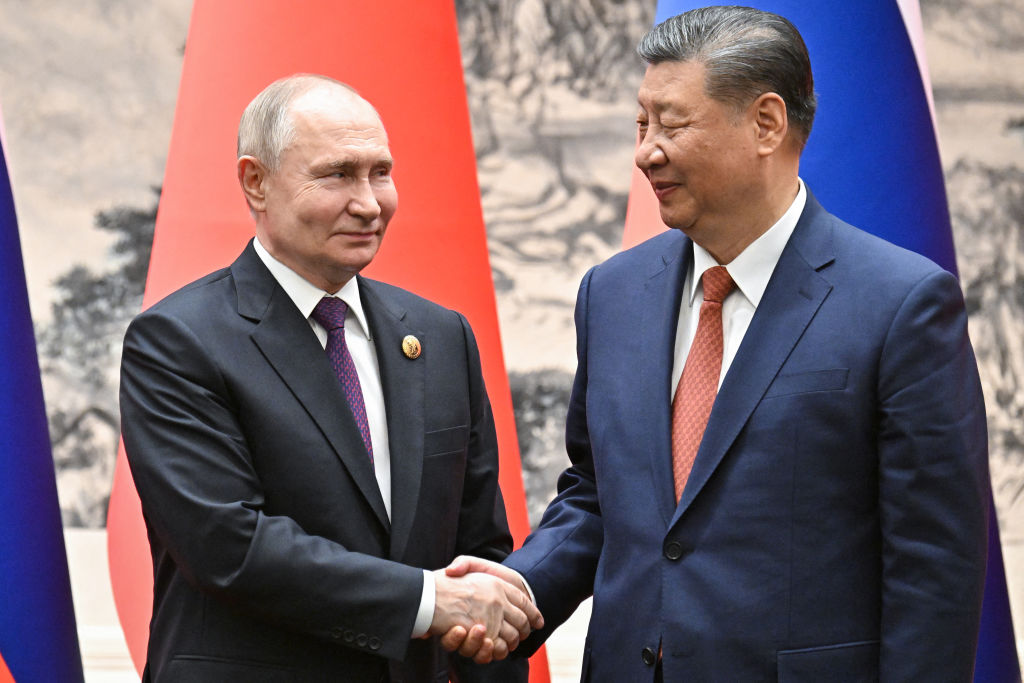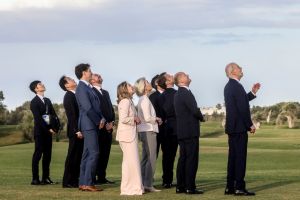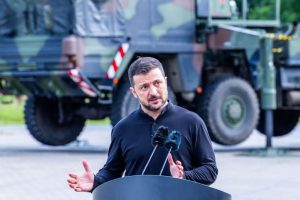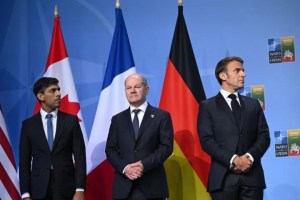Barely a week after inaugurating himself as president once again, Vladimir Putin has gone to China — his first foreign trip of his new term. He is accompanied by a rarely seen entourage of all the principal ministers of state, the head of the Russian central bank, leading industrialists and top managers of state-controlled companies.
Along with all the pomp and grandeur laid on by the Chinese, this cast list provides a handy illustration of the deepening friendship and cooperation between the two superpowers. Moscow and Beijing have a history of “eternal friendship.” But Russia and China have never truly been equal partners in their friendship with benefits.
Putin and Xi want to upend what they see as an unfair Western-dominated world order
Sino-Soviet friendship flourished in the 1950s as Joseph Stalin and Mao Zedong enforced communism on a third of the global population. China, ravaged by war and poverty at the time, sought solace in Soviet industrial and military might. The popular Soviet song, Russians and Chinese, brothers forever, echoed the sentiment of the era. The Soviet Union accounted for about 60 percent of Chinese exports and provided the nascent communist state with thousands of technicians, political advisors, machinery, raw materials, and arms.
However, this love went sour in the mid-1960s. The two communist giants moved from arguments to accusations to complete hate and even a small-scale military conflict. Mao denounced the Soviet policy of de-Stalinization and peaceful co-existence with the West, and the Soviet leaders accused Mao of deviation from Marxism.
But judging by the pomp and grandeur of Putin’s visits, both today’s and previous, the Sino-Soviet relationship has been wholeheartedly revived. True, neither China nor Russia revolve around Marxism-Leninism any longer, but Putin and the Chinese premier Xi Jinping want to upend what they see as an unfair Western-dominated world order.
Earlier this week, the Chinese foreign ministry said Xi and Putin would exchange views on ties and “international and regional issues of common concern.” Russia’s primary concern is to ensure China’s unwavering support for its war-time economy. After the introduction of the Western sanctions in response to Moscow’s invasion of Ukraine, China became Russia’s leading trading partner, nothing short of a lifeline. Since February 2022, Beijing has become the biggest market for Russian oil and gas and a key source of imports. In two years, bilateral trade increased by two-thirds to a quarter of a trillion US dollars. Chinese exports to Russia almost doubled to $211 billion in 2023, now accounting for about 40 percent of Russia’s total imports compared to 24 percent in 2021. Russia’s imports from China varies from peaceful consumer products to dual-use goods for the defense industry.
The US is trying to put an end to this: in December 2023, the US threatened to sanction bank clearing payments for anything Russia can use in its war effort. Treasury secretary Janet Yellen and secretary of state Antony Blinken visited China, trying to persuade Chinese leaders and banks to comply.
This slowed down the trade somewhat. Chinese exports to Russia dropped by 16 percent in March and 14 percent in April compared to the same period last year. China, for whom the US and the West are much more important trading partners, doesn’t want to breach the sanctions regime openly. Despite all of Russia’s pleas, China refusing to sell Moscow much-needed ammunition and arms.
However, US pressure cannot end the flow of dual-use materials, as both China and Russia found ways to work around the sanctions. Russia’s growing reliance on the renminbi is part of its strategy for doing that. Deprived of dollars and euros, Russia’s central bank uses Chinese currency to intervene in the local market. Renminbi deposits in Russia now exceed those in any other foreign currency. By the end of 2023, the renminbi accounted for more than a third of settlements in Russian foreign trade — from practically zero before 2022. This, combined with a plethora of small banks in both countries not picked up by the US sanctions radar which can facilitate the transactions, would enable the flow of dual-use goods as long as Putin and Xi desired.
To boost growth at home, the Kremlin would like to see China not only selling Russian cars and clothes but investing in their production in Russia. Moscow also wants Beijing to agree to and partly finance the construction of the Power of Siberia 2 pipeline, delivering natural gas from Siberia to China to at least partly offset the lost European market. China is not rushing to agreement, though.
Russia has little leverage over China. In exporting oil, gas and other commodities, arguably, Russia needs China more than China needs Russia, given the Western sanctions. The Russian market for Chinese exports is large but incomparable to that of the US or the EU.
So what can Russia offer? Firstly, it can offer a continuation of the war in Ukraine or with the West in general. While China officially calls for a peaceful resolution of the conflict, it is arguably more interested in prolonging it. On the one hand, the longer it continues, the less the US is paying attention to southeast Asia, where China is seeking dominance. On the other hand, the longer it goes, the deeper Russia sinks into China’s dependence.
China might also be interested in Russia’s advanced defense technologies, especially in hypersonics and nuclear propulsion, where it has worked steadily to close the gap with the West and where China continues to lag. Moscow is reluctant to share them with China, but this might change in the future.
Also, there is an old resentment over a historic injustice. This moves us back to the years of the Sino-Soviet split. In 1966, China asked the USSR to acknowledge publicly and formally that the nineteenth-century border between the two countries was unjustly imposed upon the Qing dynasty by the much stronger Russian Empire. Mao didn’t ask for a return of the annexed lands, just an acknowledgement, but the Soviets ignored him. It seems unlikely that Russia will be able to get away with that in the future.
This article was originally published on The Spectator’s UK website.


















